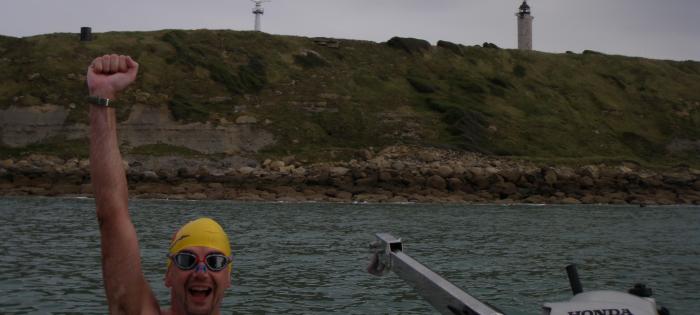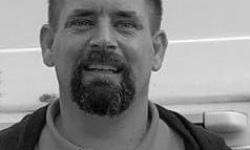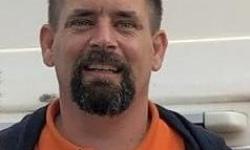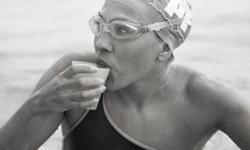07 Jul 2012Aspire Relay Swims

Two Aspire Relay teams successfully completed their one-way relays on 7 July 2012 and 28 July 2012 in a time of 17 hours, 56 minutes and 11 hours, 20 minutes, respectively.
Team Aspire's Story
Regina Luxon narrates her experiences as a part of both the Aspire Penguin Relay team and Aspire Otter Relay Team. The Penguins successfully completed their one-way relay on July 7, 2012, in a time of 17 hours, 56 minutes, after being pulled in 2011 due to adverse weather. The Otters successfully completed their one-way relay on July 28th, 2012, in a time of 11 hours, 20 minutes.
Joining Aspire as one of 36 swimmers selected from 400 to be part of one of six relay teams for 2012 was, in itself, a fantastic reward but to know that dedication, commitment and hard graft was part of the contract added to the enormity of the task in hand. The Channel is not to be taken lightly after all.
November we were notified of our selection and sent a very detailed brief of what was expected of us in the long lead up of 9 months: group training sessions (of which we were positively encouraged to be part of), fundraising targets and fitness expectations. You cannot fault Aspire Spinal Charity’s Andrew Ogierman for his attention to detail, his meticulous approach, and open-mindedness when problems arose.
Everyone was allocated into Teams – this year being the sea creature themes Penguins, Otters, Seals, Dolphins, Orcas and Turtles; each consisting of six members and a group of hardworking substitutes for just-in-case. We all knew what needed to be done to ensure our fitness and ultimately the team’s success: train, train, and train some more in sea conditions.
Aspire Penguins Relay Swim
The Penguin Team completed their relay on 7th July 2012. The call came initially at the end of June 2012, however the weather gods played a nasty game of tomfoolery and fog descended so thickly in the Channel that you could not see your hand in front of your face. This caused great angst within the Penguin Team due to pre-booked international holidays, unexpected illness meaning substitutes were needed. Wasted journeys across to the UK were also part of the weather effects. It was frustrating.
Substitutes were roped in that were available to swim and then we got the call, which conveniently came at the time Aspire were in Dover for training on the 7/8th July. This meant we were seen off by a lovely bunch of fellow Aspire relayists and the sun was shining at our 0930 start.
Initially a time of 14:30 hours was bantered about on the boat before we set off but that was not mentioned again as soon as we left the harbour mouth as we all understood that the Channel had an agenda of its own. The weather was mixed with winds, sun, and throughout the night with constant rain.
I found the first of the three swims exciting and a few calming breaths were needed as I dived in to take my turn to calm my stroke down. The second hour swim for me was a completely different swim altogether–the conditions had flattened; the experience was like swimming on a slow rolling swell as the tide took us south. The night time swim was another matter–you need to focus on the boat, regardless of the waves, that you generally can’t see and by attacking the waves and getting a hold on the water for the hour did help take my mind off the conditions. I found the conditions initially hard to deal with, but just ploughing on and racing the boat helped make the time fly by. I also did not want to let the team down by expressing my fears.
The experience of relay swimming is all about facing your hour of conditions to keep the boat moving, but waiting for your turn on the boat also cause a variety of situations to occur: sea sickness, tiredness, eating when you are not hungry, lacking energy. Dependant on the boat size, conditions can be cramped. Anastasia was palatial in my eyes, not having anything else to compare to, the stern bunks were a den of warmth and comfort between swims.
My experience with seasickness is like a torrid love affair that always goes horribly wrong when I think I have found salvation in another seasickness tablet/patch brand. Sea legs seem to work fantastically though. To combat any further seasickness, I took Sea legs at 6 p.m. that night on the boat and between swims I crawled into my sleeping bag in the stern bunk to ward off any potential problems. It did mean I missed a great deal of the camaraderie and experience but it ensured I was fit to swim. If you have to sleep, then sleep, if you have to vomit, vomit…but remember you are part of a team and you have to do what works for the group to be a success.
Relay swimming isn’t about individuals, or egos or who is the faster or even who is the slower. Throwing a group of two, four, or six people together to swim the Channel is a big expectation and success is not always a given. Cramps, fear, seasickness, cold are all demons of sea swimming and can present themselves to any swimmer. It is understanding that you are an essential part of the team that spurs you on to stay in for your required hour. Let the demons in and you let the whole team down. A fantastic incentive–don’t you think?
So our courageous bunch of six stuck together and with our complete trust placed in Eddie, we just kept getting in hour after hour–no complaints were ever uttered, smiles were always on offer by the swimmers after each hour and onwards we ploughed. Eddie guided us around tankers, avoiding shipping lane beacons on the way (I am pleased I had no idea I was so close to colliding with one!) and the joy of night swimming is even more relaxing as you can’t look forward, you just focus on the boat and swim.
Swimming on a Spring tide, the Channel currents took us on a long merry trip south of the Cap heading towards the Channel Islands, which resulted in a trip back up the coast towards Sangette due to our position in the Channel when the tide turned. But needless to say, calm remained on board and we swam on. Our focus was France, and it stayed that way. So upon landing in France, we celebrated with the usual exhausted but oh so normal over the top shrieks of jubilation satisfied in the stark realisation that at 3:40 a.m. we had successfully swum to France. The Spring tide had made no difference to us mentally other than it had taken longer – but then again time expectation was never a major consideration. Only success.
Aspire Otters Relay Swim
We had a long wait for the call, but Chris Osmond from Seafarer II rang Friday 10am to inform us all of a Saturday 4am swim. Unfortunately, I was coming from Guernsey—my 1630 ferry meant I would not arrive to the UK until 9:30 p.m., and would then have to drive four hours to Dover. The drive to Dover exhausted me; arriving at 1 a.m. and having to sleep in my car for 2 hours was not the best preparation.
Our team leader was extremely ill and extremely apologetic at her inability to continue to assist our swim. The first six hours were very rough with the boat pitching like a cork flinging us all around the boat, the wind was from the NW, the cross swell being quite confused and mixed. This meant swimming on the starboard side of the boat to shelter the swimmer a bit from the wind and to break up the waves slightly, but unfortunately it meant a wonderful mixture of diesel fumes and salt water spray every time a left arm breath was taken. During my first hour swim, I experienced both swallowing a big wave, choking on diesel fumes and then having to contend with the nauseous smell of bacon sandwiches being cooked for breakfast–pandemonium for me as I choked, vomited underwater, stopped to regain my breath, got cross and moved to the rough port side of the boat only to move back to the starboard side and swim as far towards the bow as possible.
After five hours at sea, our unfortunate seasick member of the team finally got into the water. His courage and fortitude to swim after being so ill was incredible and he never once uttered the words “I can’t do this…” He just quietly refocused his attentions to fish feeding as soon as he was back on board until the next stint. Having a paramedical background and a long sporting history, I could see we needed to keep a close eye on him. Dehydration was going to be a big issue if he couldn’t try to replace some of his lost fluids–so he sucked crystallised ginger, sipped fluids and although he kept vomiting at least he was replacing some fluids. Team members ate and drank when they needed to, lay horizontal and rested or slept when they needed to. Two team members stoically stayed out on deck keeping an eye on our fish feeder and sea swimmer.
When we reached the separation zone in six hours as our half way point, we realized we were doing well and, despite our pilot’s concern of a night swim ahead of us, we were ready for the second half. We all realised we were on for a cracking time with a bit of extra effort to be put in in the 2nd half. Our number 1 and 2 swimmers swam us across the separation zone and into the NE shipping channel, and it was explained to me visually on the chart what I needed to do for my hour as swimmer 3: basically to sprint for an hour. A tanker crossing our bow meant Chris had to position the boat directly in front of me to protect me from the resultant wake and once this happened I was in heaven.
Chasing the boat made me swim harder and faster than I thought I possibly could for the hour, and as the conditions flattened out, I moved to the port side of the boat sprinting along enjoying the pain knowing that I was making great distance and not having to breathe diesel.
Our 4th swimmer again sprinted for an hour and she made great ground. Our fish feeder followed and we all calmly encouraged him to kick hard, giving him the thumbs up every time he took a right sided breath. As the hour progressed, he was watched suspiciously by a large seal that monitored our progress for 10 mins; we didn’t share its presence with our swimmer!
France was so close and our 6th swimmer was prepared to land the swim–what seemed a 200m swim across the tide landed us just under the Cap! He swam his arms off and was no longer known as Cold Pete, but Pistol Pete! It turned out to be a brilliant Channel relay successful in 11 hours and 20mins–a channel swim of two halves: very rough for the first half and calm and quick for the second.
Concluding thoughts
So time and tide are irrelevant in the long run: training, good mental preparation, good boat preparation and team organisation once on the boat are essential. Also each individual team member should know what works for them, what they take for sea sickness, what they want to eat and drink on a boat that will literally wallow for hours as it supports the swimmer. Just like the links in a bike chain: success of the team as a whole is 100% dependant on each individual swimmer and your team as a whole should have an organised calm support crew, who is there in case you need warm drinks, help with getting dressed, first aid, even to be there to hold a swimmer as they are feeding the fish over the side of the boat during the long arduous hours between swims, to wipe your mouth, rehydrate and ensure you are ok.
Importantly as well, your pilot is the incredible font of information and knowledge for the entire swim. Never ever doubt them. They are the lynch pin of the swim’s direction, the team is the motor towards the ultimate success. So if you want to see what it’s all about, that seemingly moody stretch of water separating us from the continent, then believe, get organised and get swimming. It is possible, it is enjoyable and success tastes so fantastic.
Welcome to the wonderful world of Channel swimming. Get down to Dover, speak to fellow swimmers, listen and ask the questions, soak up the atmosphere, and camaraderie on the beach and take the time to talk to Freda, Barry, Irene, Emma and even those who may not have got across first time.
The information you will gain will help you believe you can achieve. Never say “I want to attempt...” tell yourself, “I am going to swim the Channel”. You have to think with the right attitude–the whole team does.
Those who succeed and those that don’t should know that they are applauded for their courage: brave soldiers in this wonderful world of open water swimming.
Good luck to all those who stand on the shores of England this year and set off to France, and for those contemplating it …you need to really want it and you need to believe to achieve. Go for it.
To my fellow Penguin and Otter Relay teams – well done to a cohesive determined team. It was a privilege to swim with you on behalf of Aspire Spinal charity. We could have turned around and swum back.
Regina Luxon
reginaluxon@yahoo.co.uk
- 24 Jan 2026

CS&PF Annual Dinner 2026 - One week remaining
Channel Swimming & Piloting Federation Annual Dinner 2026Saturday 14th March 2026Channel Suite - Leas Cliff Hall - FolkestoneHere we go again………………………………….This is your advance warning for the CS&PF Annual Dinner.Tickets will go on sale on the 2nd of January 2025. Full details will be advertised at www.cspf.co.uk, this is just giving you the time to get organised.Tickets are £50 person.Tickets will remain on sale until the 31st of January unless they sell out sooner. After that date I would only be able to refund any cancellations if I resell the ticket.To book your tickets please, for my sanity read the following carefully and only apply for tickets when you have ALL the information.Information required at the time of booking:The name of everyone in your party. If you wish to sit together, book together.Tables seat 10.If you are booking more than one table, please state who will be sat at which table.Dietary requirements – this cannot be accommodated on the night so must be supplied at the time of booking.Access requirements / special needs.The country you are travelling from if it is outside the UK.Swim stories to a maximum of 150 words for each 2025 season solo swimmer.Photos for each 2025 solo swimmer, and relay team in your party.Please name the file names the solo surname or relay name. ThanksMichelle Read more
Sandettie Lightship Observations
4pm, 19th February 2026
Water: 48.6 °F (9.2 °C)
Air: 43.5 °F (6.4 °C)
Wind Speed: 13.0 kn (24.1 km/h)
Wind Direction: N (350°)
The CS&PF President, Mike Ball and all the committee are deeply saddened by the passing of Ady Brown.… https://t.co/E17pLxZwgw
3 years ago











